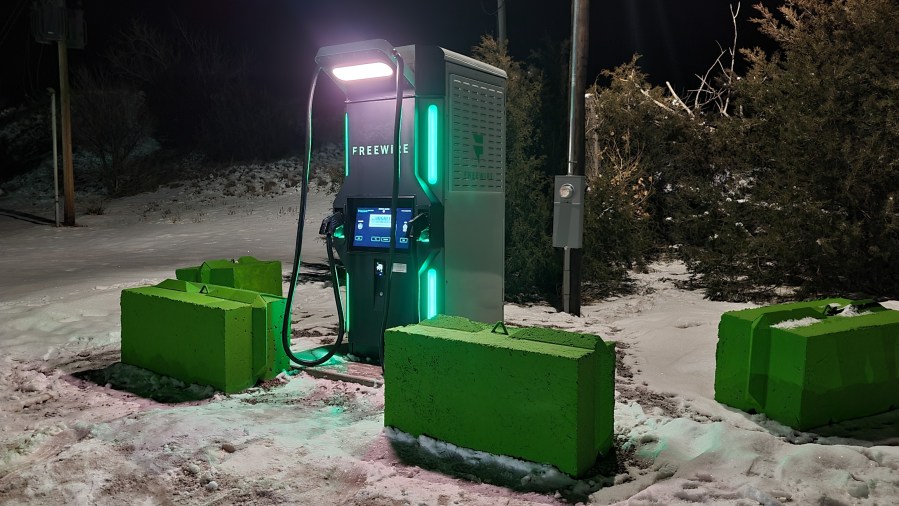Rural communities are slow to adopt EVs — but a national charging network depends on them

Road trippers Jason Fleming and Abby Barclay plugged in their electric Kia Niro at the back of a gas station in rural Julesburg, Colorado. They were a couple of hundred miles into a 1,200-mile road trip.
“We’re coming from Boulder, Colorado, going to Jackson, Michigan,” Fleming explained.
The town of Julesburg sits way up in the northeast corner of the state. It’s not an area where locals own a lot of electric vehicles. In fact, there’s only one registered EV in the entire county.
The federal government aims to change that as part of the Joe Biden administration’s larger plan to decarbonize the transportation sector by 2050. It wants to increase the number of public charging stations for electric cars tenfold by the end of this decade. Rural areas play an important role in the broader electrification plan. In the 2021 infrastructure bill, there’s $7.5 billion dedicated to building out EV chargers nationwide, with a special emphasis on rural America.
The charging station in Julesburg can give Fleming and Barclay a full charge in about 30 minutes.

“The last place we stopped … this is kind of a good top-off point,” Barclay said.
“This one’s pretty critical,” Fleming agreed. “Because there’s barely any chargers in this stretch. Actually, this is the toughest stretch for us.”
The average range for electric vehicles is 260 miles on a single charge. But cold weather — like on this day, with temperatures hovering in the mid-20s — can cut the distance short. That’s why national and state plans call for fast-charging stations every 50 miles along highways.
Tad Huser of Highline Electric, the distribution company that opened this charging station in August, said it chose the location carefully. “Getting tucked up in the corner of the state there, about 180 miles away from the metro area, is just a really good, sweet spot,” he said.

Highline reports an average of just one customer a day. “We’re not, we’re not going to be a high adoption area,” Huser said. “This is not necessarily a benefit to locals, but it’s there if they need it.”
Even though rural America has been slow to warm up to EVs, electrifying the countryside is critical, according to engineering professor Ria Kontou with the University of Illinois at Urbana-Champaign. “We need to have charging infrastructure in rural areas.”
Kontou described long EV road trips as the next frontier because the charging infrastructure that makes them possible is still emerging in places like Julesburg. “Public fast-charging infrastructure makes a difference in rural locations because it helps complete intercity trips,” she said.
One day, there may be plenty of options for electric road trippers like Jason Fleming and Abby Barclay. But for now, this station is essential for their big adventure.
“This isn’t an ideal stopping place,” Barclay mused. “But it gets the job done.”
The future of this podcast starts with you.
Every day, the “Marketplace Tech” team demystifies the digital economy with stories that explore more than just Big Tech. We’re committed to covering topics that matter to you and the world around us, diving deep into how technology intersects with climate change, inequity, and disinformation.
As part of a nonprofit newsroom, we’re counting on listeners like you to keep this public service paywall-free and available to all.
Support “Marketplace Tech” in any amount today and become a partner in our mission.












